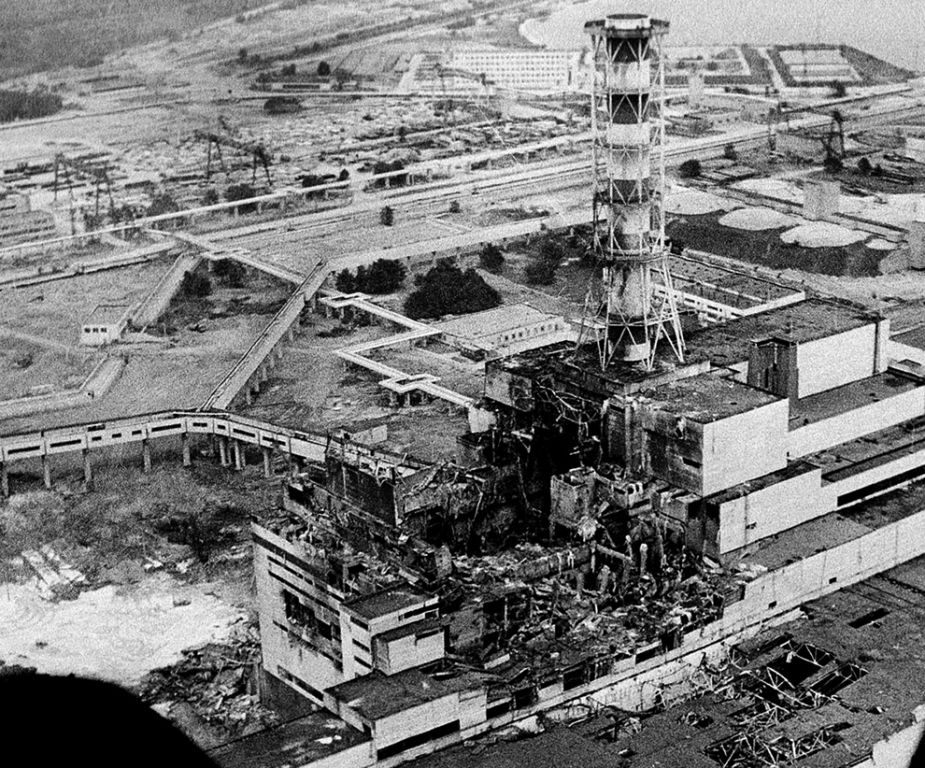
Chernobyl could have turned into an even more terrible disaster, were it not for the self-sacrifice of these heroes, about which most of us have never heard.
This year was the 31-year anniversary of the accident at the nuclear power plant that destroyed Chernobyl (Ukraine). On April 26, 1986, NPP staff conducted a system test, which resulted in two explosions and fire in one of the four nuclear reactors. The reactor began to melt, and the catastrophe that followed was the biggest accident in the history of nuclear energy, both for economic damage and for the number of victims.
The explosion triggered the release of radiation, which was 400 times greater than the effect of the atomic bomb that exploded over Hiroshima, and spread across the territories of Ukraine, Belarus, Russia, Poland and the Baltic countries. Dozens of people died immediately, soon the victims began to be estimated at tens of thousands. In hundreds of thousands of other consequences affect the course of a lifetime. According to experts, the number of long-term victims of radiation poisoning continues to grow and 30 years after the disaster.
The Chernobyl accident was an indescribable disaster. But without the efforts and sacrifices of three people, it would turn into a truly unimaginable catastrophe.

Only five days after the explosion, on May 1, 1986, the Soviet authorities in Chernobyl made a terrible discovery: the active zone of the exploded reactor was still melting. The core contained 185 tons of nuclear fuel, and the nuclear reaction continued at an appalling rate.
Under these 185 tons of molten nuclear material was a reservoir with five million gallons of water. Water was used at the power plant as a coolant, and the only thing that separated the core of the melting reactor from water was a thick concrete slab. The melted active zone slowly burned this plate, descending to the water in the smoldering stream of molten radioactive metal.
If this is incandescent, the melting reactor core touched water, it would cause a massive, radiation-contaminated steam explosion. The result could be a radioactive contamination of most of Europe. According to the death toll, the first Chernobyl explosion would look like a minor accident.
The Soviet authorities explained the circumstances of the impending second explosion, a plan for its prevention and consequences: in fact, it was an imminent death from radiation poisoning.

Three men voluntarily offered their help, knowing that this is likely to be the last thing they will do in their life. They were a senior engineer, an intermediate engineer and a shift supervisor. The task of the shift supervisor was to keep the underwater lamp, so that engineers could identify the valves that needed to be opened.
The next day the Chernobyl "3 man" donned equipment and plunged into a deadly pool.
In the pool, there was pitch darkness, and the light of the waterproof lantern at the shift supervisor was reportedly dull and intermittent.
Moved in the murky darkness, the search did not bring results. Divers wanted to complete radioactive navigation as soon as possible: at each minute of sinking, the isotopes freely destroyed their bodies. But they still have not found the drain valves. And so they continued their search, even though the light could go out at any moment, and darkness could close over them.
The lantern really burned out, but it happened after his ray had taken the trumpet out of the darkness. Engineers noticed her. They knew that the pipe led to the same valves.
Divers in the dark swam to the place where they saw the pipe. They grabbed hold of her and began to climb, intercepting their hands. There was no light. There was no protection from the radioactive, harmful to human body ionization. But there, in the darkness, there were two latches that could save millions of people.
Divers opened them, and water poured out. The pool began to empty quickly.
When the three men returned to the surface, their case was done. Employees of the nuclear power plant and soldiers met them as heroes, so they really were. They say that people literally jumped for joy.
Over the next day, all five million gallons of radioactive water flowed out from under the fourth reactor. By the time the melted core above the pool had made its way to the reservoir, there was no more water in it. The second explosion was avoided.
The results of the analyzes carried out after this dive coincided in one thing: if the troika did not sink into the pool and did not drain it, from a steam explosion that would change the course of history, hundreds of thousands or even millions of people were killed and injured.
The lives of hundreds of thousands of people were saved by three people.
During the following days, the three began to exhibit unavoidable and unmistakable symptoms: radiation sickness. After a few weeks, all three died.
The men were buried in leaden coffins with sealed lids. Even devoid of life, their bodies were thoroughly imbued with radioactive radiation.
Many heroes went on feats for the sake of others, having only a small chance to survive. But these three men knew that they had no chance. They peered into the depths, where they were met by a certain death. And plunged into them.
They were called Alexei Ananenko, Valery Bespalov and Boris Baranov.
Congratulations @olha! You received a personal award!
Click here to view your Board
Downvoting a post can decrease pending rewards and make it less visible. Common reasons:
Submit
Congratulations @olha! You received a personal award!
You can view your badges on your Steem Board and compare to others on the Steem Ranking
Vote for @Steemitboard as a witness to get one more award and increased upvotes!
Downvoting a post can decrease pending rewards and make it less visible. Common reasons:
Submit